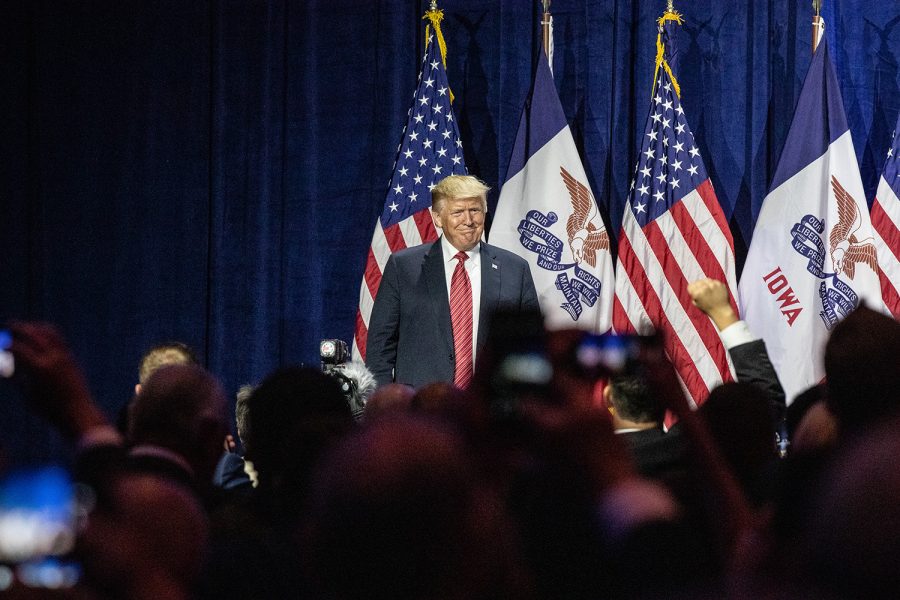Grassley, Ernst join Republicans in vote to acquit President Trump
The senate voted to acquit President Trump on Wednesday, capping four months of partisan battles on Capitol Hill.
President Donald Trump pauses during a speech at the Iowa GOP’s America First Dinner at the Ron Pearson Center in West Des Moines on June 11, 2019.
February 5, 2020
Republican senators from Iowa Joni Ernst and Chuck Grassley joined the majority of their party in voting to acquit President Trump on charges of abuse of power and obstruction of Congress on Wednesday afternoon.
The four-month impeachment saga sprung from an Aug. 12 whistleblower complaint alleging that Trump had pressured Ukrainian President Volodymyr Zelensky to investigate former Vice President Joe Biden and his son, Hunter Biden, in connection to their dealings with Ukrainian gas company Burisma.
The vote came after about two weeks of deliberation, with House prosecution managers and Trump’s defense lawyers trading places on the Senate floor to give their arguments for hours between Jan. 22 and 25.
Grassley gave a speech on the Senate floor Monday, explaining that he didn’t think Trump’s actions rose to the level of impeachment. Grassley did not deny the fundamental Democratic argument, that Trump had solicited investigations into his political opponent in exchange for foreign aid, but he said the president acted within the limits of the law.
“A president isn’t prohibited by law from engaging the assistance from a foreign ally in an anti-corruption investigation,” Grassley said in his speech.
Grassley claimed the argument from House Democrats rested on a subjective interpretation of the president’s motive. He said convicting Trump on the charges in the articles of impeachment would lower the bar of impeachment and set a dangerous precedent for the future.
“The ambiguity surrounding the House’s abuse of power theory gives this senator reason enough to vote not guilty,” he said.
Ernst’s remarks Tuesday followed much of the same material as Grassley, and she argued that the judgement of Trump’s conduct should be left up to voters in November — a major argument given by several Republican senators.
“Under the Constitution, impeachment wasn’t designed to be a litmus test on every action of the president,” Ernst said. “Elections were designed to be that check.”
Ernst came under criticism on Sunday after suggesting in an interview with Bloomberg News that Republicans in the Senate may impeach Biden immediately should he become president. However, she said Monday those comments were taken out of context.
The vote fell largely along party lines, with Sen. Mitt Romney, R-Utah, being the only Republican to break from the party and vote to convict. Romney said in a speech just ahead of the vote that he believed Trump had personal and political motivations for ordering the investigations, and that his conduct warranted removal from office.
“What he did was not perfect,” Romney said. “No, it was a flagrant assault on our electoral rights, our national security interests, and our fundamental values. Corrupting an election to keep oneself in office is perhaps the most abusive and destructive violation of one’s oath of office that I can imagine.”
The Senate deliberations came at a critical time in the 2020 presidential campaign, as Democratic candidates were flooding the state ahead of the Iowa caucuses. Presidential candidates in the Senate — Amy Klobuchar, D-Minn., Bernie Sanders, I-Vt., Elizabeth Warren, D-Mass., and Michael Bennet, D-Colo. — had to cancel events and send surrogates around the Hawkeye State during the week of hearings.






